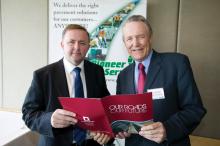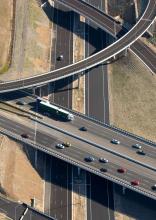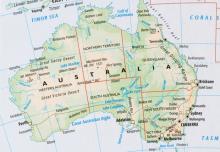Roads Australia is encouraging its members to get behind TravelSmart, the government-led campaign to promote sustainable transport alternatives and reduce our reliance on private cars. A number of TravelSmart initiatives and programmes were highlighted at a recent meeting of RA's Congestion Chapter. It was stressed at the meeting that Roads Australia members could set an example for the community by getting its organisations more involved in the programme.

RSS6194 Roads Australia is encouraging its members to get behind 6195 TravelSmart, the government-led campaign to promote sustainable transport alternatives and reduce our reliance on private cars.
A number of TravelSmart initiatives and programmes were highlighted at a recent meeting of RA's Congestion Chapter.
It was stressed at the meeting that Roads Australia members could set an example for the community by getting its organisations more involved in the programme.
"How we manage network demand can have a significant impact on congestion, and programmes like Travel Smart are showing us a way forward," says RA president, Ray Fisher.
"As an industry with a vested interest in roads, we have a responsibility to play a lead role in encouraging more efficient use of our existing road assets."
TravelSmart, which has been going across Australia for a number of years, is about reducing reliance on cars and making smart choices about other forms of transport.
The programme is backed by federal, state and territory governments, with all actively involved in projects and programmes that lead the way in influencing change.
The recent meeting of the Congestion Chapter highlighted TravelSmart programmes in Victoria, Queensland and South Australia as examples of the kind of actions being undertaken across the country.
A South Australia project, the TravelSmart Households in the West Project, was cited as a particular example of success.
This project, an initiative of the SA Department of Transport, Energy and Infrastructure, started in 2005 with the aim of reducing private car usage by encouraging behavioural change, with the overall goal of reducing greenhouse gas emissions.
The project targeted suburbs in Adelaide's west, home to 13% of the city's population. A widespread communications strategy set out to encourage people to reduce their dependancy on their cars in favour of more environmentally sustainable travel and transport choices.
The final report, released in January this year, revealed an average reduction in car kilometres travelled by participants of 18%, while public transport usage in the targeted areas rose by 6%/year.
Furthermore, the project was shown to have had a positive effect in reducing both the average number of trips per day and the average distance travelled daily by participants over the evaluation period.
More recently, a TravelSmart pilot programme run by Queensland Transport and Main Roads is seeking to change work habits in Brisbane.
The Flexible Workplace Program - Brisbane Central Pilot was run in June, promoting three separate initiatives: flexible start and finish hours (outside the peak travel hours), telecommuting, and a compressed work week.
A number of government departments and private organisations based in the Brisbane CBD and surrounding suburbs took part in the pilot. At the completion of the pilot, participants were surveyed to measure any changes to their work patterns and identify any barriers or benefits encountered.
In May, the department also conducted a flexible workplace forum with attendees from government agencies and private businesses.
Meantime, in Victoria a range of innovative TravelSmart initatives are being promoted such as a Bike-share pilot at Monash University and the participation of state schools in National Ride2School Day earlier this year.
Roads Australia's policy director, Christine Keyes, said one of the best ways to influence public policy in this area is to lead by example.
"We're encouraging our members and players across the wider road industry to consider implementing TravelSmart programmes, or to take part in government-initiated programmes, so as to play an active lead role in addressing the congestion problem," she says.RSS
A number of TravelSmart initiatives and programmes were highlighted at a recent meeting of RA's Congestion Chapter.
It was stressed at the meeting that Roads Australia members could set an example for the community by getting its organisations more involved in the programme.
"How we manage network demand can have a significant impact on congestion, and programmes like Travel Smart are showing us a way forward," says RA president, Ray Fisher.
"As an industry with a vested interest in roads, we have a responsibility to play a lead role in encouraging more efficient use of our existing road assets."
TravelSmart, which has been going across Australia for a number of years, is about reducing reliance on cars and making smart choices about other forms of transport.
The programme is backed by federal, state and territory governments, with all actively involved in projects and programmes that lead the way in influencing change.
The recent meeting of the Congestion Chapter highlighted TravelSmart programmes in Victoria, Queensland and South Australia as examples of the kind of actions being undertaken across the country.
A South Australia project, the TravelSmart Households in the West Project, was cited as a particular example of success.
This project, an initiative of the SA Department of Transport, Energy and Infrastructure, started in 2005 with the aim of reducing private car usage by encouraging behavioural change, with the overall goal of reducing greenhouse gas emissions.
The project targeted suburbs in Adelaide's west, home to 13% of the city's population. A widespread communications strategy set out to encourage people to reduce their dependancy on their cars in favour of more environmentally sustainable travel and transport choices.
The final report, released in January this year, revealed an average reduction in car kilometres travelled by participants of 18%, while public transport usage in the targeted areas rose by 6%/year.
Furthermore, the project was shown to have had a positive effect in reducing both the average number of trips per day and the average distance travelled daily by participants over the evaluation period.
More recently, a TravelSmart pilot programme run by Queensland Transport and Main Roads is seeking to change work habits in Brisbane.
The Flexible Workplace Program - Brisbane Central Pilot was run in June, promoting three separate initiatives: flexible start and finish hours (outside the peak travel hours), telecommuting, and a compressed work week.
A number of government departments and private organisations based in the Brisbane CBD and surrounding suburbs took part in the pilot. At the completion of the pilot, participants were surveyed to measure any changes to their work patterns and identify any barriers or benefits encountered.
In May, the department also conducted a flexible workplace forum with attendees from government agencies and private businesses.
Meantime, in Victoria a range of innovative TravelSmart initatives are being promoted such as a Bike-share pilot at Monash University and the participation of state schools in National Ride2School Day earlier this year.
Roads Australia's policy director, Christine Keyes, said one of the best ways to influence public policy in this area is to lead by example.
"We're encouraging our members and players across the wider road industry to consider implementing TravelSmart programmes, or to take part in government-initiated programmes, so as to play an active lead role in addressing the congestion problem," she says.RSS









